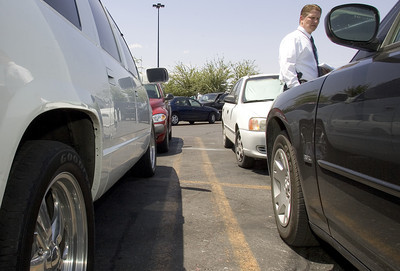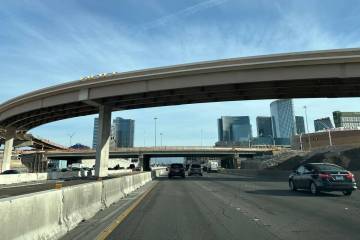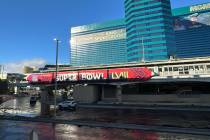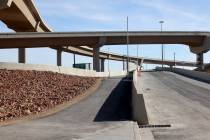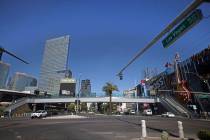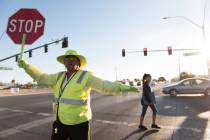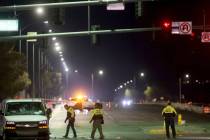Police efforts succeed in lowering traffic deaths, car thefts
When it comes to our cars and roadways, Clark County Sheriff Doug Gillespie and the Metropolitan Police Department deserve a lot of credit.
Traffic fatalities in Clark County dropped by 15 percent over the past year, to 113 in 2008 from 133 in 2007.
This is the second year in a row traffic fatalities have come down. They dropped 20 percent from 2006 to 2007.
This has been a major initiative for Gillespie since he was elected sheriff.
The traffic bureau under Capt. Richard Collins has led the way. One of the effective strategies police have used is to identify high crash areas and then swarm the area with patrol units and traffic officers. These swarm tactics are also used on our freeways to discourage speeding.
Another significant victory for police in 2008 was the 30 percent drop in automobile thefts, to 11,481 in 2008 from 16,393 in 2007.
Only four years ago, there were nearly 20,000 auto thefts in the department's jurisdiction. And in 2006, Clark County lead the nation in auto thefts per capita.
Initiatives by Metropolitan Police Department Lt. Bob DuVall's auto theft task force called VIPER, which includes detectives from the North Las Vegas and Henderson police departments, are greatly responsible for the reduction.
DuVall's unit has targeted chop shops and used bait cars and high-tech cameras that quickly scan license plates to find stolen cars in parking lots.
They've also used psychological techniques as a deterrent, including announcing that bait cars were in use at mall parking lots during the holiday season.
Though I doubt auto theft will ever be completely quashed in Las Vegas, there are some preventative measures you can use to help avoid falling victim to this crime.
The National Insurance Crime Bureau, a nonprofit group that helps insurers and law enforcement agencies identify, detect and prosecute insurance criminals, has created a layered approach to protecting your vehicle.
Layer 1 is Common Sense. Never leave the keys in the ignition, lock vehicle doors and close the windows, and park in well lit areas.
Layer 2 is Warning Devices. These include:
•Alarm systems, which range from $150 to $1,000.
•Steering column collars, which help prevent thieves from "hot-wiring" vehicles. Cost is between $100 and $200.
•Steering wheel locks such as The Club. They're a great visual deterrent and prevent the steering wheel from turning. Cost is up to $100.
There are also locks that keep the brake pedal from being used, which cost up to $80.
Additionally, wheel locks, or "steel boots," which cost up to $200, will prevent a vehicle from moving.
A tire lock or deflator can be attached to the tire valve stem. They cause the tire to flatten if it rotates before the lock is removed; cost is up to $50.
•A theft deterrent decal, about a $5 item, warns thieves that the vehicle has an anti-theft device.
•Identification markers in or on the vehicle. These make it harder for thieves to sell the vehicle or parts; costs up to $100.
•Micro dot marking, which is used to spray or paint an epoxy resin on vehicle parts or in components that can be traced; costs between $150 and $250.
Layer 3 is Immobilizing Devices. They include:
•Smart keys that contain computer chips or emit radio frequencies. Without the key, the vehicle won't start. This comes standard with some vehicles.
•Fuse cutoffs, which short circuit the electrical system, preventing the vehicle from starting; costs up to $90.
•Kill switches, which stop electricity or fuel until a hidden switch is activated; costs up to $125.
•Starter, ignition and fuel disablers, which short circuit the electrical or fuel system. Standard in some vehicles.
•Wireless ignition authentication, which uses transmitters on a key chain or in a wallet that activates the ignition circuitry; costs between $250 and $350.
Layer 4 is Tracking Systems, which send signals using wireless technologies to police when the vehicle has been stolen.
Costs range from $350 to $1,000.
If you have a question, tip or tirade, call the Road Warrior at 702-387-2904, or e-mail him at roadwarrior@reviewjournal.com. Please include your phone number.
The North Las Vegas Public Works Department has begun construction of the North Fifth Street Corridor. When complete the corridor will act as a north to south arterial roadway.
The $250 million project will stretch seven miles, from Owens Avenue north to the Las Vegas Beltway, and include an Interstate 15 flyover and a wider North Fifth Street from two to up to eight lanes, including 10-foot-wide landscaped sidewalks and an express bus lane.
The first phase of construction will take place on North Fifth, from Lake Mead Boulevard to Carey Avenue and will require the following road closures:
North Fifth Street, from Judson to Carey avenues.
Bartlett Street at the North Fifth intersection.
Orr Avenue at the North Fifth intersection.
Glendale Avenue at the North Fifth intersection.
Carey Frontage Road at the North Fifth intersection just south of Carey Avenue.
White Street at the intersection with Carey.
Motorists should use alternate routes. The project is expected to take several years to complete.
AAA’s Tipsy Tow program is offering a free ride and tow, up to five miles, after the Super Bowl to help reduce drunken driving. The service will be offered from 6 p.m. today through 6 a.m. Monday. Call 800-222-4357 to take advantage of the program.
Las Vegas Review-Journal



